Richard Goodman's Blog, page 14
April 28, 2023
The moon is ours
Like any place we humans visit, it will eventually become violated. If it hasn’t been already.
Think all we’ve left on the moon’s surface are an absurd golf ball, various size-fourteen shoe impressions and a jerry-rigged flag? Think again. Not only have we left much detritus on the moon—various intentionally crashed modules (over twenty), three lunar-roving dune buggies (it’s beginning to look like a used car dealership) and lots of other mess—so have Russia, China (throw in two more rovers), India, Israel, the European Space Agency (whatever that is), Japan and—ready for this?—Luxembourg. (Do they need a new subject for a stamp?!?)
There are an estimated 445,000+ pounds of abandoned junk, much of it sizable, littering the moon. Read the annotated list. Its 85+ major-objects breakdown isn’t even complete, having left out “lesser” items such as a hammer and other tools, a Bible, goodwill message disc, commemorative plaques, etc. Really? It’s like some kind of urban park after a Fourth of July weekend.
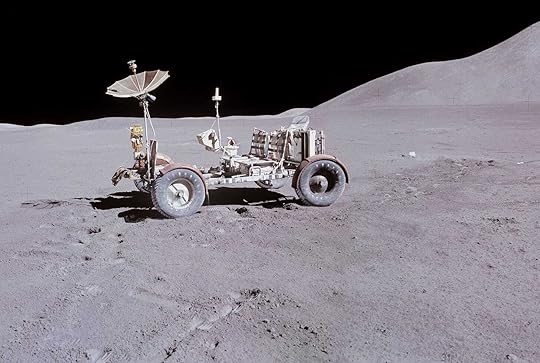 This baby only has 234 miles on it! Yours for a song!
This baby only has 234 miles on it! Yours for a song!The moon is one of the few things we have on Earth that everyone, and anyone, can experience. That’s not true of oceans, mountains, lakes, deserts, canyons, forests. Some people will never see an ocean or a mountain or a forest. Everyone can see the moon. Like the sun and the stars, it’s a universal connector. It’s owned by no one—at least not yet. It’s a shining mystery for everyone to be inspired by, no matter where they live, or when.
Indeed, anyone can mark its waxing and waning, from crescent to crescent, and its different iterations—blue, blood, yellow. Even within the probing eyes of a telescope, the moon is still stirring. And always that pale fire, as Shakespeare described it, shining whitely down on us. Who hasn’t been moved by the moon? Who hasn’t looked up to a full moon at night with appreciation in their heart?
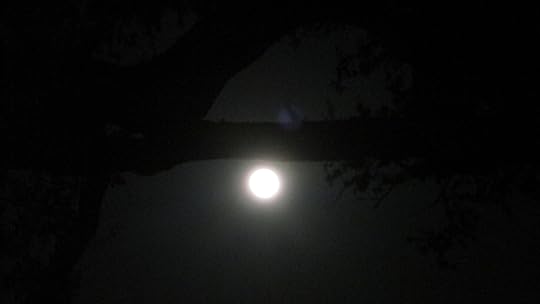 The moon from our home in Louisiana under a live oak
The moon from our home in Louisiana under a live oakThere will be over 100 missions to the moon over the next decade, some to place people on its surface. Yes, you read that number correctly. That includes ours. What benefits are there to putting people on the moon? To live there? To build strip malls? To create a lunar Airbnb? Unlikely? There’s a new TV series, Hello Tomorrow! in which the main character sells timeshares on, where else, the moon.
W.H. Auden wrote a scathing poem about all this called “Moon Landing.” He published it just a month after the first moon landing in 1969. He has a striking line, among many, “Irreverence / is a greater oaf than Superstition.”
Do we really need to know it all? Can’t some things be left unknown or unknowable? Can’t we preserve a sense of wonder where it still exists in our world? Let it continue to amaze us with its grandeur and mystery?
Leave it alone, the moon. Absurd thought, I know. Nothing I say will change anything. But I’ll say it anyway.
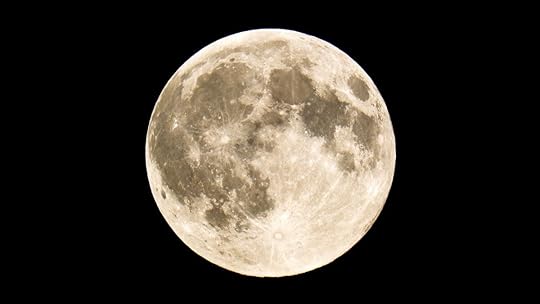
April 21, 2023
Living together less than nine months, and now this...
Well, here I am. This, I never could have imagined. Living with her, Gaywynn. You know how they say that life is full of surprises. That life is unpredictable. That life never turns out like you thought it would. That’s a cliché, I know. I don’t even pay attention to it when someone says it. Well, I do now. Because it surely is. Unpredictable, I mean. I’m living in a small old house that’s highly in need of care in the middle of Cajun country about 2 ½ hours west of New Orleans with a woman I love who I never set eyes upon until I was 73.
Last night, we made a dish from a cookbook titled, Jerusalem. We enjoy cooking together. Like many of the recipes in the cookbook, it’s singular, exotic, I-never-thought-of-anything-like-that-before, kind of dish. Roasted eggplant with fried onion and chopped lemon.
At one point, we were required to sauté four sliced onions—that’s a lot of onion—over high heat for about ten minutes and then add cumin powder and chopped green chili. When we added the ingredients to the hissing, darkening onions, a great cloud of white smoke slammed our faces and filled the kitchen. It made us start coughing, the smoke itching and burning our lungs. We opened the back door to air the kitchen out. Not enough. The acrid smoke was leaping into our lungs, unrelenting. Nothing to do but flee. We turned off the heat and ran out of the kitchen, then out the front door, hacking away, plopping down on the front porch chairs, gasping fresh air—and laughing. WTF? What happened?
“Couple Killed Making Eggplant Dish,” I said in a New York Times voice.
Gaywynn laughed. I did, too.
“Police found Gaywynn Menard and Richard Goodman sprawled on their kitchen floor, dead, with no visible signs of foul play,” I continued. “Later, the coroner declared, ‘Cause of death: Eggplant.’”
“What caused that smoking?” Gaywynn said, trying to figure out the origin of our insane coughing.
“The cumin? The green chilies?” I wondered.
Neither of us had any idea, but we both found the thought of dying from an eggplant dish to be indescribably funny. Think of it. How would the obituary read? How would your friends and relatives explain this? Laughing was the best part of the whole scenario.
I used to make Gaywynn laugh at almost anything I said. Especially the first few months we were living together. Ok, many of my jokes—not all, mind you— were what are often called Dad Jokes. You know, bad puns, or jokes with tortured punch lines. I thought they were clever. Very funny. Example:
Me: “What’s an Italian dog that’s always hungry?”
Gaywynn: “I don’t know. Tell me.”
Me: “A ciao hound.”
Since those early months, she’s grown accustomed—jaded, perhaps might be the more accurate word—by many of my trying-hard jokes. In fact, recently she began responding with a Buster Keaton deadpan look followed by a fake laugh.
“But…but…you always loved my jokes!” I said once.
Gaywynn shrugged. I’ve had to up my game. She’s become merciless. I guess things change in a relationship, even humor.
However, an interesting thing happened the other day. We were sitting at the kitchen table. I’m still processing this, actually. I had something that was on my mind. I said to Gaywynn,
“Can we be frank here?”
She paused.
“Can’t we be Bob instead?” she said.
It took me a second to realize what she’d actually said. Yes, she did say that.
“That was a good one, wasn’t it?” she said.
She looked at me expectantly.
“You’re becoming me,” I said. “Do you realize that?”
“No, really, that was funny, wasn’t it?”
April 14, 2023
Letters
This is about letters. The writing, receiving and reading of letters. This doesn’t happen much any more. Very rare. True, people send personal e-mails to one another, but those aren’t letters. The letters I’m referring to are written by hand. With a pen. Or even a pencil. Anything but with a computer.
Handwritten letters from friends and lovers provide a presence, almost as if the person had jumped out of the mailbox. Yes, mailbox, something else that eventually will probably go by the wayside.
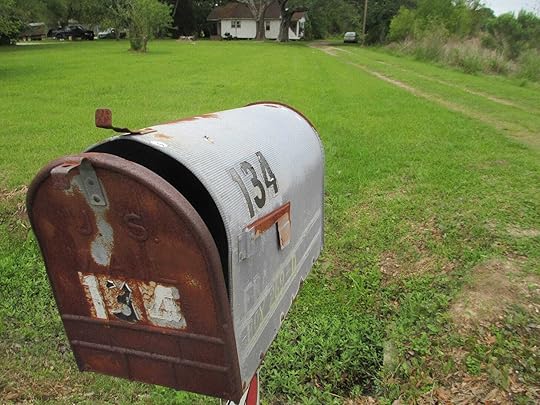 Our mailbox. Will there be a letter?
Our mailbox. Will there be a letter?Letters give something not even the actual person can standing before you. Because they’re written in that person’s handwriting. Which is as distinguishing as the way they walk. You can see into a person’s heart through their script. The way the words are created, formed, how they’re built, how the sentences are drawn, all this reveals something about that person no other way can.
Sometimes, when you receive a letter from a friend for the first time, you’re a bit thrown off. This is their handwriting? But…they’re not like that. Evidently, they are.
I was a big writer of letters. I sent many-paged letters, in fat envelopes, to friends and loved ones consistently through the years. Writing a long letter is a commitment. Especially if you throw yourself into it with gusto and sincerity. You can be exhausted after writing a letter like that. It’s a labor of love.
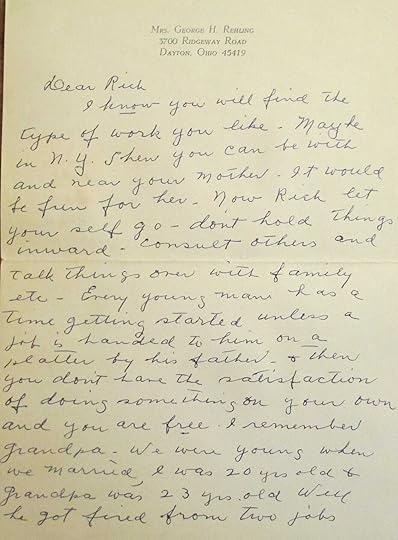 Letter from my grandmother, March 1972, with sound advice.
Letter from my grandmother, March 1972, with sound advice.Why not just pick up the phone instead of writing a letter? Because you can’t express yourself in the same way on the telephone—as deeply, roundly, extravagantly, flowingly. A letter allows for wanderings, for waywardness, for sudden realizations, for small bursting epiphanies. It also allows for pauses in the writing, for reflection, for changes of mind, even for retractions. My letters often have words or lines crossed out. They can start to look like redacted reports from the FBI. I always re-read my letters before inserting and sealing, and sometimes I think: what? No! Cross it out. Try that on the phone.
Letter writing can be a kind of ramble, like a good walk. Sometimes I’m not certain where I’m going or where I’ll end up, just that I’m going. That’s part of the pleasure. The letter writing hand is the legs of the mind.
When I’m in the middle of writing a letter, sometimes my hand can’t keep up with my thoughts. Then my writing becomes a kind of frantic fury. My mind always wins, but my hand sometimes comes a close second, like one of those foot races where you need a camera to determine the winner. If I’m really going, I can even sweat from the excitement and effort, especially in summer. More than once I’ve seen a drop of my sweat plop into a letter I was writing and obliterate, or partially obliterate, an inky word. My hand in its energy can actually become slick with sweat, and that can be a potential loss of an entire line, especially since I’m left handed. (Try it and you’ll see.) Hazards of the game.
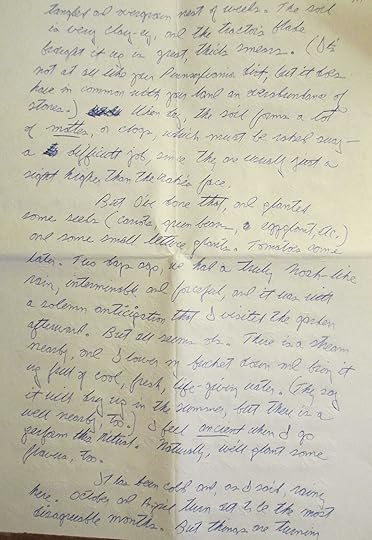 A page from a letter I wrote to a friend thirty-five years ago from France. She kept it and gave it to me later to help me remember what I’d experienced. I’ve been told my handwriting can be hard to read. Well, bad. True?
A page from a letter I wrote to a friend thirty-five years ago from France. She kept it and gave it to me later to help me remember what I’d experienced. I’ve been told my handwriting can be hard to read. Well, bad. True?Getting a corpulent envelope in the mail from a good friend lifts my spirits high as a kite. There it is, waiting in the mailbox, this treasure. Who knows what thoughts, what confessions, worries, what gossip, accomplishments, bits of wisdom are inside? I can’t wait to open it.
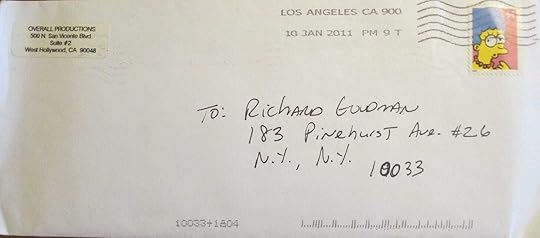 Letter from my great friend, Deborah Attoinese. Joy, joy, joy. I’d know her hand anywhere.
Letter from my great friend, Deborah Attoinese. Joy, joy, joy. I’d know her hand anywhere.Letters have assuaged my loneliness and homesickness when I was someplace far away and missing those I love and home. It’s almost as if the writer is there, breathing on the page. You can almost hear their voice. I’ve carried letters with me in my backpack for weeks, even months, traipsing through foreign lands. Letters have rescued me, consoled me, buoyed my declining spirits. What was a week where I felt so alone, so lost, so down, suddenly was turned around by a letter from a friend or family member. Holding a much-anticipated letter in my hand, seeing the familiar handwriting on the front, was so often a cure, an antidote to the aloneness. Reading it was a lifeline.
I remember, even now, so many years since, when I was a kid in boarding school, far away from home and family, so alone and lonely that it hurt, getting a weekly letter from my father, seeing his singular writing, and feeling warm and loved, cared for, remembered. Not alone. Thanks to that letter.
One of the distinct pleasures, among many, of letters is not just the reading of them but the re-reading. I keep letters. You can see the postmark from Deborah’s letter above. That’s just one from in our huge correspondence. We’ve exchanged letters for forty years. I have dozens of her letters I keep in a protected place. I love re-reading them. They never disappoint.
When you throw away—or, worse, burn—letters, there is something no-turning-back about that gesture. The end. You are tossing or burning a personality.
We have come to an era where people may never know what their friends’ handwriting even looks like, much less receiving a letter from them. Many will never even receive a letter. Maybe a Christmas card or a brief thank you note, if that. Do I write letters these days? No. I’m lamenting what I don’t do just as much as what others don’t do. I’m a passenger on that departing ship. I have a few friends who still write me handwritten letters, though. Thankfully. What a beautiful thing.
April 7, 2023
Rain, the sublime
It’s raining here in rural Louisiana. It rained all night and is still raining now at 7:50am. It often rains hard and long in this part of the world. I’ve spent many hours watching and listening to the hard rain as it comes down. The thunder here in Louisiana is monumental, too, sending animals scurrying under the bed or looking about with worried looks. I’ve never heard louder thunder, anywhere. It feels like someone is ripping open the sky.
I love the sound of rain, the steady rhythm of it, the sweetness of its consistency. I’m not alone. Rain cleans. It purifies. It’s water from the sky, and every living creature needs it to grow and thrive. It’s a mystery. Rain is a gift. It’s often prayed for. Conjured for. Yes, there are violent rains. There are rains of all types, including incessant and destructive rains. But basic rain is a beauty, a cause for optimism.
 Rain, our front yard
Rain, our front yardSo many times, in so many situations, rain makes is feel an emotion we probably we be good to feel more often. Gratitude.
March 24, 2023
My lack of understanding of women
I’m not sure boarding school is totally responsible for my lack of understanding of women. I think there’s some natural ability at work here. I have quite a few witnesses to that effect. I can see them raising their hands high to be heard. But boarding school has its share of the blame, I’m convinced.
The boarding school I went to in the 1950s and early 60s when I was a teenager, until I graduated, is located in the Midwest. It’s classic, beautiful on the outside, austere and hierarchical on the inside. And there were no girls. None. The faculty were all male. For nine months out of the year, the only females you were exposed to were the kitchen staff and faculty wives at dinner.
 All boys, and we mean it.
All boys, and we mean it. The result was that girls were alien to me. With no daily exposure to girls, I had no way of learning anything about them, of relating to them as people, of becoming friends with them, even, maybe, with great fortune, being a boyfriend.
It’s hard enough being a teenager. When everything inside you is pinballing around, and you have no idea what you’re doing, or where you’re going, or who you are, or might be. But to throw in the fact that all this is happening in an all-male environment, when you’re check-by-jowl with boys just as messed up as you are, and you have a recipe for the unnatural—like priesthood.
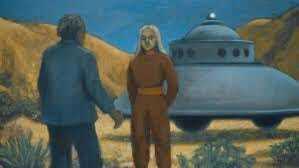 Hello, my name is Richard. Who, or what, are you?
Hello, my name is Richard. Who, or what, are you?I learned all too well about my lack of understanding of women when I went off to college. I went to the University of Michigan. I soon discovered there were females. In class, on campus, in the library, at football games. Everywhere.
I remember going to the cafeteria in the evening and seeing girls walking around in short shorts and T-shirts, calm as anything. I realized then and there I had absolutely no idea of how to approach them, much less how to speak to them. The same was true in classrooms. I simply did not know how to interact with females. I could have had a better chance flying a 747.
 Do your mothers know you’re wearing those shorts?
Do your mothers know you’re wearing those shorts?I finally mustered the courage one day to talk to a girl in the cafeteria. She was very pretty, blonde, slim, lively. We were both in line. She grabbed a tray, and so did I. I watched her as she piled her plate up with food. She heaped on fat scoops of mashed potatoes, covered them with gravy, slapped slices of meat beside that and took a few rolls along with some token vegetables and a hefty dessert.
I couldn’t believe my eyes. But you’re a girl! I screamed in my head. You can’t eat that much! We sat down together, and I watched her tuck it all in enthusiastically. She was enjoying herself! Eating!! Aren’t girls supposed to be, well, delicate? Reserved? Not hungry?
 Mmmm, good—isn’t it?!?
Mmmm, good—isn’t it?!?We sat down together. I was in awe, didn’t know how to react, didn’t know what to say. It occurred to me I hadn’t seen many girls my age eat. And that was the thing! I hadn’t seen many girls do anything normal or ordinary, like eat, walk, read, study, laugh. On a consistent, daily basis.
I remember when the girl finished eating her food. She looked over to my plate, eying my unconsumed mashed potatoes. She asked, calmly,
“Are you going to finish those?”
“Uh, no,” I said. “I’m full.”
“Can I have them?” she asked.
“Yes. Sure. Go ahead.” I think my voice broke.
She did. She polished them off handily. I was dumbstruck.
I metaphorically raised my eyes to God.
“Please tell me,” I prayed, “what to do next.”
Her name was Susan Koloski. (I’ve changed her name, because she’s alive and well, and not everyone wants their youth paraded in front of them.)
We started going out. She was from Detroit, from a traditional Catholic family. She was hungry for everything. From her, I learned many of the things I might have learned had I gone to a co-ed high school. She didn’t hold back her desires. She wasn’t ashamed of her appetites. We had a great time together. She was my real prep school.
Later, she cheated on me with a hockey player. Even that was an education. My first real hurt of betrayal. She'd been seeing him while we were still together. I was so clueless, I even went with her to visit him in the hospital after he had some kind of operation. I should’ve guessed something was going on by the way she fawned over him. But I didn’t know how to read those things.
“Why?” I asked her when she told me she was leaving me for him.
She shrugged her shoulders. “I guess I fell out of love with you and fell in love with him.”
Boarding school and my lack of understanding of women
I’m not sure boarding school is totally responsible for my lack of understanding of women. I think there’s some natural ability at work here. I have quite a few witnesses to that effect. I can see them raising their hands high to be heard. But boarding school has its share of the blame, I’m convinced.
The boarding school I went to in the 1950s and early 60s when I was a teenager, until I graduated, is located in the Midwest. It’s classic, beautiful on the outside, austere and hierarchical on the inside. And there were no girls. None. The faculty were all male. For nine months out of the year, the only females you were exposed to were the kitchen staff and faculty wives at dinner.
 All boys, and we mean it.
All boys, and we mean it. The result was that girls were alien to me. With no daily exposure to girls, I had no way of learning anything about them, of relating to them as people, of becoming friends with them, even, maybe, with great fortune, being a boyfriend.
 Hello, my name is Richard. Who, or what, are you?
Hello, my name is Richard. Who, or what, are you?I learned all too well about my lack of understanding of women when I went off to college. I went to the University of Michigan. I soon discovered there were females. In class, on campus, in the library, at football games. Everywhere.
I remember going to the cafeteria in the evening and seeing girls walking around in short shorts and T-shirts, calm as anything. I realized then and there I had absolutely no idea of how to approach them, much less how to speak to them. The same was true in classrooms. I simply did not know how to interact with females. I could have had a better chance flying a 747.
 Do your mothers know you’re wearing those shorts?
Do your mothers know you’re wearing those shorts?I finally mustered the courage one day to talk to a girl in the cafeteria. She was very pretty, blonde, slim, lively. We were both in line. She grabbed a tray, and so did I. I watched her as she piled her plate up with food. She heaped on fat scoops of mashed potatoes, covered them with gravy, slapped slices of meat beside that and took a few rolls along with some token vegetables and a hefty dessert. I couldn’t believe my eyes. But you’re a girl! I screamed in my head. You can’t eat that much! We sat down together, and I watched her tuck it all in enthusiastically. She was enjoying herself! Eating!! Aren’t girls supposed to be, well, delicate? Reserved? Not hungry?
 Mmmm, good—isn’t it?!?
Mmmm, good—isn’t it?!?We sat down together. I was in awe, didn’t know how to react, didn’t know what to say. It occurred to me I hadn’t seen many girls my age eat. And that was the thing! I hadn’t seen many girls do anything normal or ordinary, like eat, walk, read, study, laugh. On a consistent, daily basis.
I remember when the girl finished eating her food. She looked over to my plate, eying my unconsumed mashed potatoes. She asked, calmly,
“Are you going to finish those?”
“Uh, no,” I said. “I’m full.”
“Can I have them?” she asked.
“Yes. Sure. Go ahead.” I think my voice broke.
She did. She polished them off handily. I was dumbstruck.
I metaphorically raised my eyes to God.
“Please tell me,” I prayed, “what to do next.”
Her name was Susan Koloski. (I’ve changed her name, because she’s alive and well, and not everyone wants their youth paraded in front of them.)
We started going out. She was from Detroit, from a traditional Catholic family. She was hungry for everything. From her, I learned many of the things I might have learned had I gone to a co-ed high school. She didn’t hold back her desires. She wasn’t ashamed of her appetites. We had a great time together. She was my real prep school.
Later, she cheated on me with a hockey player. Even that was an education. My first real hurt of betrayal. She'd been seeing him while we were still together. I was so clueless, I even went with her to visit him in the hospital after he had some kind of operation. I should’ve guessed something was going on by the way she fawned over him. But I didn’t know how to read those things.
“Why?” I asked her when she told me she was leaving me for him.
She shrugged her shoulders. “I guess I fell out of love with you and fell in love with him.”
March 17, 2023
My brilliant friend
Many people have written love letters to their cars.
My favorite is E.B. White’s “Farewell, My Lovely!,” about his old Model T Ford, published in the May 16, 1936 issue of The New Yorker. I’m a fan of anything E.B. White writes, and this is no exception. He writes with adoring specificity about his long-lost Model T.
White sets down a description of his Ford that fits my 2010 Ford Focus to, well, a T: “As a vehicle, it was hard-working, commonplace, heroic.” Indeed, that’s precisely how I feel about this car I’ve owned and driven for thirteen years. I love my Ford Focus.
I bought it at a dealership in the Bronx in New York. It was sitting in the showroom, and the salesman was clearly eager to have it relinquish that prized spot for something more profitable. I saw that the windows were not automatic. You had to roll them up and down manually, like I had in the cars I grew up with. The accoutrements were minimal, if not Spartan. Its color was an appealing light green. Four-door. Automatic. He gave me a good deal. I went with it.
 The object of my affection. (The state of Louisiana requires just one license plate, in back.)
The object of my affection. (The state of Louisiana requires just one license plate, in back.) Not a single day has gone by that I have regretted that choice. This little hard-working, commonplace, heroic car has taken me here and there with nary a problem, save for a few expired batteries, worn tires, and a matter of air conditioning that stopped working. That’s it—in 13 years. It’s reliable as the sunrise.
Driving this car makes me feel many virtues that I hold dear: simplicity, loyalty, hard work, efficiency, modesty and uncomplaining. It’s done everything I’ve asked of it, and more. It’s transported me four times from Louisiana to Maine and back without a hiccup. It ferried me faultlessly to and from my apartment in New Orleans to the University of New Orleans campus where I worked for eleven years at least 3,960 times. It steadfastly ushered me to my girlfriend Gaywynn’s house in rural Louisiana the thirty or so times I went to see her when we were falling in love for a total of around 8,100 miles. It’s brought me to weddings, doctor’s and dentist’s appointments, parties, weekend visits, movies, drugstores, garden centers, to beaches, lakes and forests, in rain, snow, sleet, fog, bursting sunshine, in heat and cold—all cheerfully, without a hitch.
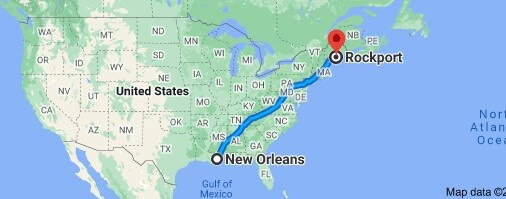 Four times up and back, like it was nothing.
Four times up and back, like it was nothing.I’ve faithfully taken my Focus to the Ford physician through the years for its annual check-up. I’ve learned that mechanics have a special affection for the Focus. Once I brought my car to a Ford dealership on Long Island, and, as I handed the service manager the keys, he said, with a sweet look, “Ah, the little Focus.” What does the venerable Consumer Reports say? “The original Focus was nimble and fun to drive, with quick and communicative steering and a comfortable ride.” Nimble! Yes! Nimble as all get-out.
I’ve been in many different automobiles through the years as a passenger while owning my Focus. Never once have I had a glimmer of envy. So many of these automobiles have dashboards that look like the console of a nuclear reactor. My minimal controls—radio, heat, AC (same dial), lights, wipers—that’s it, I think—are all adjusted by my, or, more likely, Gaywynn’s hand. I have nothing—nothing!—controlled by a computer. I’ve seen countless times those devices that do everything but monitor your blood pressure—wait, was there one car that did that?—go wrong and die, costing the owner considerable time and money to fix the temperamental machine. The Focus’s modus operandi? Less means less can go wrong.
 My console. Thoreau-like simplicity.
My console. Thoreau-like simplicity.I’ve neglected to mention its size—small. Not diminutive, but small, just 14.5 feet in length. Its turning radius is brief. It seems to be able to turn a complete circle on itself. Parking my Focus has been a driver’s dream. I’ve been able to edge myself neatly into highly improbable spaces between cars that 97% of other drivers have had to pass by forlornly, silently cursing the length of their vehicles.
Yes, I admit, the Focus is not the most solid of cars. Its frame and chassis have a tinny sound to them as does its trunk. But let me tell you, I’ve never felt concerned in high winds that it would be lifted away. And, yes, it has some flaws. Its headlights are not as brilliant as I wish they were, and on dark, late-night roads, I mutter about their feebleness. As for its engine—I knew you’d ask—it’s got four cylinders and 140 horsepower. Well, that horse must be some thoroughbred, because the Focus has a great deal of spirit. If called upon, by a quick, definitive press of the foot on the accelerator, it jumps off like Seabiscuit. I ask, it responds.
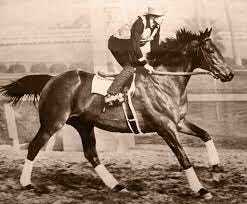 My car’s spiritual ancestor
My car’s spiritual ancestorI refuse to think about the day when my Focus will begin to show its age, began to break down, and, eventually, require hospice. (Well, it is showing its age a bit, if I’m completely honest.) I’ve learned that Ford no longer makes the Focus model. Why not, for heaven’s sake? My Focus and I are as close as man and machine can be. I know some people would say, it’s just a car. It may be a car. But it’s not, and never will be, just a car.
March 10, 2023
Teaching my girlfriend Yiddish
I don’t speak Yiddish fluently. Or even semi-fluently. But having lived in New York City for thirty-five years, I acquired a basic store of Yiddish words that, like many New Yorkers, Jewish or not, I employ as part of my ongoing vocabulary. Plus a smattering of Jewish expressions in English. The language may be dying, but certain words live on, and, I hope, always will.
I moved to rural Louisiana last June to be with my girlfriend, Gaywynn. She’s a Cajun who has been to New York maybe twice, does not especially like it, and, having lived in Louisiana most of her life, has a limited knowledge of Jewish culture. It goes without saying—but I’ll say it anyway—she does not speak Yiddish. As part of our time together, we’ve had a lot of fun with my teaching her some words in Yiddish. Of course, some Yiddish words have even traveled as far as Cajun Louisiana, to this little place where we live about 2 1/2 hours west of New Orleans, deep in the country. Gaywynn knows schmooze, chutzpah, klutz and even shtick.
Other than that, bupkis. Nothing.
By the way, before I get too far into this, the best use of Yiddish by a non-Jew for comic effect is in the movie, A Mighty Wind, when Ed Begley, Jr., as Lars Olfen, speaks in a scene he overcrowds with Yiddish words. Wait—we can’t forget Jimmy Cagney speaking Yiddish in the 1932 movie Taxi! Also, by the way, some of these Yiddish words I put down here have different spellings. Consult your rabbi.
Moving on from those acknowledgements back to Gaywynn and me, we usually have these little lessons either at the dinner table or driving in the car. She’s fascinated by Yiddish. Ironically, she learns Yiddish much faster and more securely than French, a language her Cajun grandfather spoke fluently but which she does not. Who knew?
One of the first words I taught her was meshuggeneh, which means “crazy” in Yiddish. As in, “He must be meshuggeneh to try to lose thirty pounds in ten days!” She loves that word. She learned it immediately, loves saying it, and has retained it. I know, because I came up to her up once while she was making gumbo said, “Quick! What’s “crazy” in Yiddish??”
“Meshuggeneh,” she said, without missing a beat.
The next day I said to her, “If you know meshuggeneh, you need to know mishegas.”
“What’s that?”
“It means “craziness.” As in, “Who needs to deal with all that mishegas on Black Friday?”
I introduced her to one of the all-time great Yiddish words, or words in any language, schlep. Which means to go somewhere, or carry something, with difficulty. It’s most always used as a kind of complaint. The word has complaint in its DNA. As in, “I had to schlep my brother-in-law thirty miles to the dentist because his car’s in the shop.”

Next came what I consider certain core Yiddish words, like putz (a jerk), kvetch (to complain), nosh (to snack), mensch (good guy), shiksa (female, non-Jewish), mitzvah (good deed), l’chaim! (to life!). Of course, some of these words have made their way into everyday English and no longer need to be italicized. But they were new to Gaywynn. Naturally, I had to expose her to oy vey. No, she didn’t know it. I told her it means something like “Oh no!” and is a way of expressing dismay or frustration, and is a must for any interested gentile to who wants to learn some Yiddish.
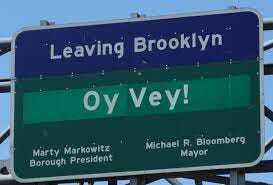
One non-Yiddish (but Jewish) expression I taught her she was astounded by. And that is, “Did you make?” It’s used by Jewish mothers (and, in modern times, I would guess Jewish fathers, too) everywhere. It’s normally shouted through the bathroom door when their child is sitting on the toilet. This plaintive cry means, “Did you move your bowels?” Your mother wants to know! It’s important! Gaywynn had a hard time believing this expression exists.
A few days after a Yiddish lesson, I’ll ask Gaywynn for a certain English word in Yiddish she learned. Invariably, she’ll come up with the answer. Her intonation is good, too. She’s a natural!
“Who were you, Molly Goldberg in another life?”
“Who’s that?”
 Molly Goldberg, aka Gertrude Berg
Molly Goldberg, aka Gertrude Berg“Never mind. Are you sure some of your ancestors didn’t come from a shtetl?”
“Shtetl?”
“Means a little town, mostly Jewish, in Eastern Europe or Russia. Think Fiddler on the Roof.”
“I think most of my ancestors are French.”
I feel this is a way for Gaywynn to feel connected to my New York, a city I hold close to my heart and whose culture I absorbed over decades and that has become a crucial part of me. I also want to have the same knowledge of her background. We have Cajun lessons as well, because I want to know about her culture. I’m not doing as well with Cajun expressions and, especially, with the Cajun accent as she is with Yiddish. I’m trying!
This morning, as I do every morning, I got up early and made myself a cup of coffee before going to my study to try to write. I turned on my computer, and, as usual, stared at it, waiting for it to tell me what to do. It never does. I drank some coffee and pondered. Would anything come? I heard Gaywynn stirring in the kitchen. She has her rituals. She always makes a cup of coffee and then sits on the couch, waking up and checking her texts and e-mails on the phone.
After a while, frustrated, I got up to go the bathroom. I walked into the living room and saw Gaywynn there, sitting on the couch. She smiled at me. She has the brightest, sunniest, most beautiful smile, and it’s a lovely way to greet the day. I smiled back, said good morning and headed to the bathroom.
“Are you going to make?!?” she askedm.
March 3, 2023
Panic attack
One afternoon, some years ago, I went to my ex-wife’s office in Midtown New York City. I don’t remember the reason. We hadn’t been divorced that long. Things were still raw. I know I was. But there I was, in her Midtown office building, on a high floor. I remember at one point glancing out onto the street below and then, suddenly, my throat seized. My breathing became short. I felt as if every second were a struggle. As if I were learning how to do everything for the first time.
They didn’t use the term “panic attack” back then, but I’m certain that’s what it was. I didn’t have any idea at the time what was happening. I knew it wasn’t a heart attack. It was something else, something formidable. Whatever it was, it was in control, not me.
“I’m not sure I can get home,” I said to my ex-wife.
This got her attention, coming out of the blue as it did.
“Do you want me to call you a cab?”
“Maybe,” I said. “I just need a minute.”
As I say, I didn’t know what was happening, or why. I’m sure if there had been a therapist standing next to me, he or she might have said, “Well, clearly, you’re reacting to….” But I was without a handy therapist. I was alone. I’d never experienced anything remotely like that before. It scared me.

A panic attack feels like you are going to be swallowed by a black hole of yourself and disappear. Or that you’re drowning on land. This thing has you, and it won’t let go. Nothing you do or say to yourself diminishes its hold. “Panic” is a good word. No one takes “panic” lightly. I don’t hear it used that often, and that’s good, because if it were, it might begin to loose its impact.
The etymology of the word is enlightening: “from the Greek panikon, literally ‘pertaining to Pan,’ the god of woods and fields, who was the source of mysterious sounds that caused contagious, groundless fear in herds and crowds, or in people in lonely spots.”
“…or in people in lonely spots.” That sounds right to me.
Now that I know others have been the object of a panic attack, I can understand why some people I knew in the past reacted how they did on certain occasions. It was odd to me, their sudden, great alarm and withdrawal. In fact, I probably was one of those who made fun of the term and condition. I wouldn’t put it past me back then. Not now. Not anymore.
It’s the case with all unnamed afflictions, isn’t it? The beginning of remedy is naming. We’re used to the term “panic attack” now, and so we don’t look at people who experience them as freaks.
I remember leaving the building and walking out into the street, unsteady and on the edge. I declined my ex-wife’s offer of a cab, feeling a vestigial sense of capacity tempered by a desire to appear manly. But it was not an easy trip home by subway. When I did get home, I was shaken. Would this happen again? If it did, what would I do? Would I make it back home next time? Or would I collapse on the street? Or would I disappear?
This mind and body we have. They provide us with the most wondrous, exhilarating experiences. Once in a while, though.
February 24, 2023
A few words from me and my newsletter
I want to thank all of you for subscribing and/or reading my newsletter. I try my best to say something that at the very least is entertaining. And that might even give you a little lift.
Six months ago, I moved to rural Louisiana, following my heart to be with my girlfriend, Gaywynn. I’d been living in New Orleans for eleven years. Before that, I lived in New York City for thirty-five years. That’s a total of forty-six years of urban living. Fifty, if you count the two years I lived in Detroit, the year in Chicago and the year in Boston. And now here I am living on a sparsely-occupied road on three acres of land in a small—believe me—house that Gaywynn’s Cajun grandparents built near the boudin capital of the world, Scott, Louisiana. Do you know what boudin is? I mean Cajun boudin. I didn’t.

I’m writing about that conversion, about my new life and about love at an age when most people are checking out denture ads and I’ve-fallen-and-I-can’t-get-up alarms. It’s all an amazing surprise, and I’m grateful. I write about other things as well, often, hopefully, with humor. Here’s one of my favorite pieces about going to a personal trainer.
I’m writing now to ask your support. I mean monetary. Normally, people on Substack offer something special for those with paid subscriptions, but I haven’t figured that out yet. I’m just asking those of you who feel they can afford it, to sign up for a $5-a-month plan or for $50 a year. I won’t object if you want to contribute more. Honestly.
If you’re already a subscriber, you’ll still receive these posts. I understand completely if you’re not able to pay anything. Read away, as before! But if you do enjoy reading what I write and can afford a few bucks every month or a yearly contribution, I would most appreciate it. It will help me to continue doing what I do, I assure you.
Thank you!
Richard
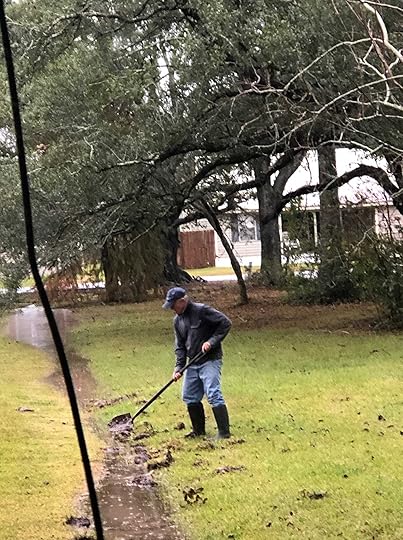 My new Louisiana life
My new Louisiana life



